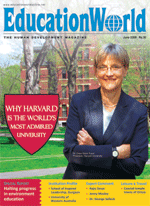Harvard’s corpus advantage
 Your well-written cover story on Harvard University (EW June) reaffirms its status as a role model for any univ-ersity worldwide to emulate. As the author rightly points out, the secret of Harvard’s success is its remarkable fund-raising capability. Through its endowment corpus (currently valued at $28 billion) painstakingly accumulated over the years, Harvard is able to implement its need-blind admission policy, recruit high-quality faculty and provide superb academic facilities to students.
Your well-written cover story on Harvard University (EW June) reaffirms its status as a role model for any univ-ersity worldwide to emulate. As the author rightly points out, the secret of Harvard’s success is its remarkable fund-raising capability. Through its endowment corpus (currently valued at $28 billion) painstakingly accumulated over the years, Harvard is able to implement its need-blind admission policy, recruit high-quality faculty and provide superb academic facilities to students.
In contrast, the bane of Indian universities is that they are grossly under-funded and heavily dependent on grudging government handouts. The concept of building endowment corpuses is unknown to public and private schools, colleges and universities. Therefore Indian education institutions are perennially cash-strapped and have little money to spend on infrastructure, research or student scholarships.
Moreover the sword of government control and supervision is constantly dangling over them, inhibiting any progressive initiatives. That explains why Indian universities don’t figure anywhere in international league tables.
Karunesh Anand
Chennai
For elites by elites
I am writing in response to the Harvard cover story (EW June), which touts the university as the most admired in the world. While I agree with the writer’s sentiments regarding Harvard faculty’s wise decision to forego early specialisation for students, and believe it’s something universities in India should consider implementing, I have to question the merit of a cover story on an elite American university that a majority of Indian students will never even visit, let alone attend.
I understand Harvard’s admissions process is extremely competitive, and that the typical “memorisation-centric” style of teaching puts Indian students applying to this top-notch university, at a disadvantage.
Is there any hope for the average Indian student, or, as I suspect, is Harvard only for elites with high-ranking connec-tions and millions available for the finest private school educ-ation? If Dr. Faust’s refusal to grant an interview for the story is any indicator, it seems one has to know the right people to gain any sort of access to this world-renowned university.
Suman Bakshi
Mumbai
Teach parents first
Preservation of the environment is the last priority of Indians, as is obvious in the garbage-littered civic streets, pavements strewn with plastic bags, and the ever growing problems of water scarcity and deforestation. It’s sad that though children have an instinctive love of nature and environment, they are not given opportunities to practically help in preserving the ecology. As Summiya Yasmeen writes in her special report in the June issue, environment education has become another theoretical subject, divorced from real life.
Moreover as adults we are not good eco role models. Children often see their environment education teachers littering roads with plastic bags, and their parents cutting down trees in the garden to make way for an extra room or garage. If environment education is to be taken seriously, teachers and parents first need to be counseled in the basics of eco conservation.
Snigdha Gandhi
Delhi
Big favour
Your special report on the gross violation of children’s rights (EW May) has exposed the myth about the so-called positive attitude of state and Central governments, as well as NGOs, towards protecting and restoring children’s rights in India. By international standards, India’s child rights record is pathetic. Child abuse is rampant; the girl child has to face serious problems at home, in school and society. Moreover children are routinely deprived of adequate nourishment, education, healthcare and other necessities.
The meagre annual outlays of the Central and state governments for education show the nation as a whole doesn’t care about its children. I hope in its second innings the UPA government takes immediate steps to change this dismal scenario.
Your magazine has done a big favour to the deprived children of India by highlighting their problems.
Rupali Abhang
Pune
Pure profit motive
Dilip thakore is gullible. NIIT, whose top three honchos featured on the cover (EW May) receive annual salaries of Rs.1.50 crore each, is driven by sheer profit motive. Rajendra Pawar’s protestations about NIIT University being a not-for-profit institution are all hogwash and pure baloney.
Prakash Gogte
Mumbai
Dream world
Ayyo, sister! Why you are bothering about children’s rights (EW May)? Do you really believe that the country’s rapacious politicians will make the smallest sacrifice for other people’s children? If so, you are living in dream world.
Anand P.
Coimbatore
Law & order?
It’s all very well to write about the charms of coastal Karnataka (EW May). But what about the law and order situation there? The area is full of smugglers and sexual predators. And you won’t find a policeman, even if you have a powerful telescope!
Raghavan E.R on e-mail